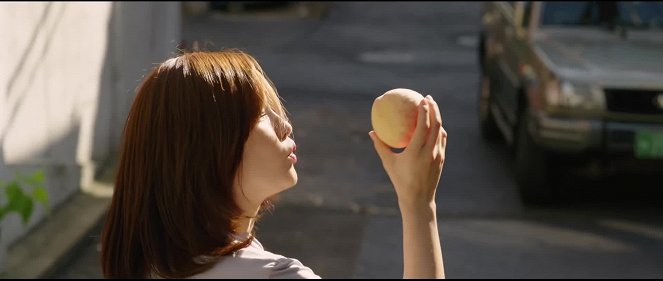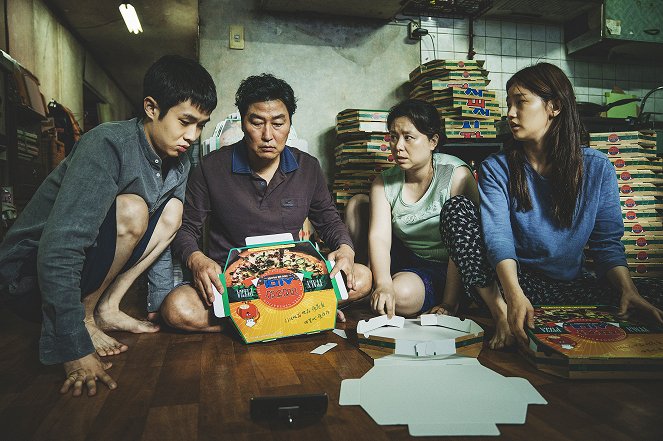Directed by:
Joon-ho BongCinematography:
Kyung-pyo HongComposer:
Jae-il JungCast:
Kang-ho Song, Sun-kyun Lee, Yeo-jeong Jo, Hye-jin Jang, Woo-shik Choi, So-dam Park, Seung-min Hyeon, Hyun-jun Jung, Myeong-hoon Park, Keun-rok Park (more)Plots(1)
A zeitgeist-defining sensation that distilled a global reckoning over class inequality into a tour de force of pop-cinema subversion, Bong Joon Ho’s genre-scrambling black-comic thriller confirms his status as one of the world’s foremost filmmakers. Two families in Seoul—one barely scraping by in a dank semibasement in a low-lying neighborhood, the other living in luxury in a modern architectural marvel overlooking the city—find themselves on a collision course that will lay bare the dark contradictions of capitalism with shocking ferocity. A bravura showcase for its director’s meticulously constructed set pieces, bolstered by a brilliant ensemble cast and stunning production design, Parasite cemented the New Korean Cinema as a full-fledged international force when it swept almost every major prize from Cannes to the Academy Awards, where it made history as the first non-English-language film to win the Oscar for best picture. (Criterion)
(more)Videos (5)
Reviews (22)
In Parasite, the South Koreans twist human emotions and create a premise just as absurd and obscure as when Rammstein were singing about that Austrian guy who kidnapped Natascha Kampusch and held her in his cellar for more than ten years. Moreover, they do it with dangerously dark humor, which I don’t even know whether it’s funny at all, because it makes me gape at the screen rather than laugh. In the context of South Korean cinematography, however, this is a unique gem that has no match.
()
The Koreans pulled this off in all aspects. The humor that accompanies the film is edgy and the viewer easily gets caught up in the internal strife. Should we hate them or love them? Should we wish them well or condemn them? Either way, I haven't seen a script this masterful in a long time. The acting was superb, the cast was every bit as good, and the soundtrack bumped the experience up a notch. 5 stars.
()
Unfortunately I can't go with the flow. I totally acknowledge that the film is well made. The cinematography was for me the best part of the whole movie. But the rest of it... tone deaf? Because I didn't find it funny. I don't like it when people get tricked like that, and here it escalated to unfortunate heights for my taste. Not to mention the ending, which was to be expected from a certain point on. I don't think it was anything innovative. I don't think it deserves so much attention, but the film obviously came at the right time in the right place. Mostly I also thought it was too long. It didn't feel like 132 minutes, it felt like three days. I guess I need to establish some sort of rapport with the characters, I need someone to at least be likeable; it didn't happen here. I couldn't even sympathize with them, nothing. Cold. Maybe it was meant to be, in which case it's a completely unsatisfying film for me. Great cinematography, good cast, but a totally cranky Ziza.
()
In dealing with popular genres, Parasite is more perfidious than the crime film Memories of Murder, the monster movie The Host and the postapocalyptic sci-fi flick Snowpiercer. Its narrative is not pieced together by conventions of a single genre that Bong would modify or refuse to comply with. Rather, it changes solely based on how the characters see and react to certain situations. Unlike in ordinary genre films, evil is not concentrated in a particular monster or villain, but manifests itself in the actions to which the protagonists resort in an effort to gain and maintain a certain social status. Predatory capitalism is the real antagonist. In the film, it is an invisible force that strengthens people’s desire to live someone else’s life. ___ The entire plot is derived from a particular social reality and the relationships between members of various classes of society, who are trying to game the system or defend the positions that they have achieved. Due to the rules that have been put in place, however, it is not possible to do either fairly. Reaching the top requires self-denial and crossing numerous boundaries. Disrespecting and breaching those boundaries comprise the dominant formal strategy and the film’s central metaphor. The rich live thanks to the hard work, blood and sweat of the poor, while the poor parasitise those who live in even deeper poverty in order to scratch out a living. They simultaneously need and hate each other. The space of clearly defined boundaries, the crossing of which will have unfortunate consequences, is an expansive modern house which from the outside represents a dream space for the protagonists. Its location on a hill contrasts with the central quartet’s modest home crouching below street level. Although the claustrophobically cramped interiors contribute to the fact that the destitute family sticks together more, they offer incomparably less comfort than the spacious rooms of the villa, whose inhabitants are spatially and emotionally more distant. ___ Though Parasite verges on farse through most of its runtime, in the end we perceive most of the characters rather as tragic victims of social stratification and economic injustice. The protagonists’ successes no longer bring comic catharsis, but vacillation as to whether the denial of one’s own individuality can be legitimised by the effort to maintain one’s position in the system. Amusement alternates with worries, compassion and a sense of injustice. Bong achieves this by altering the rhythm of the narrative and through skilful changes of perspective that redirect our sympathies. In the end, the tones of the individual characters’ stories are so incompatible that a reversal occurs and instead of a mere game of conquering the Wild West, there is a real and bloody breaking down of the boundaries between fiction and reality, civilisation and wilderness. The film involves not only a clash of different classes and ways of relating to the world, but also a blending of horror, black comedy and melodrama. The mastery with which Bong combines these seemingly incongruent elements into a consistently entertaining whole, in which every cut and movement of the camera is calculated with Hitchcockian precision, offers the most convincing argument against doubts as to whether a similarly “viewer-friendly” film deserved the Palme d’Or at Cannes. 90%
()
(less)
(more)
The cult Czech one-liner "Don't be angry that I'm bothering you again, but I forgot to ask if you have a cellar. Do you have a cellar? And could I see it?" elaborated in the form of a feature film consisting in (by far not only) a thriller mixed with a black-humor class satire in which you never know what you can believe as a spectator. This could have easily ended up as an embarrassing mishmash (and this has happened to Bong Joon-Ho in the past), but it resulted in a scathing masterpiece that give the South Korean wave a second wind. Second wind? This is not a simple revival, but a full-fledged comeback in several respects.
()



Ads